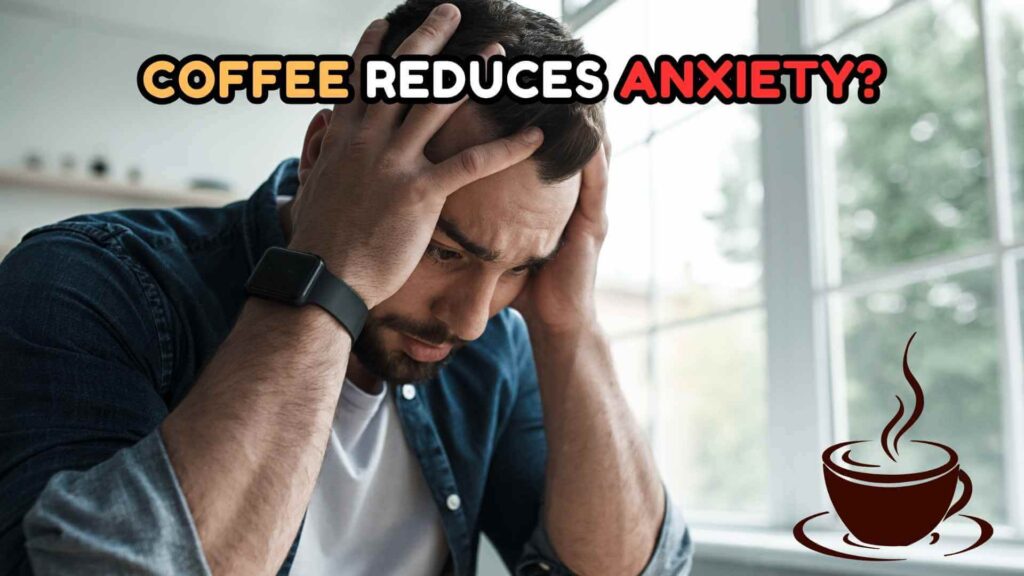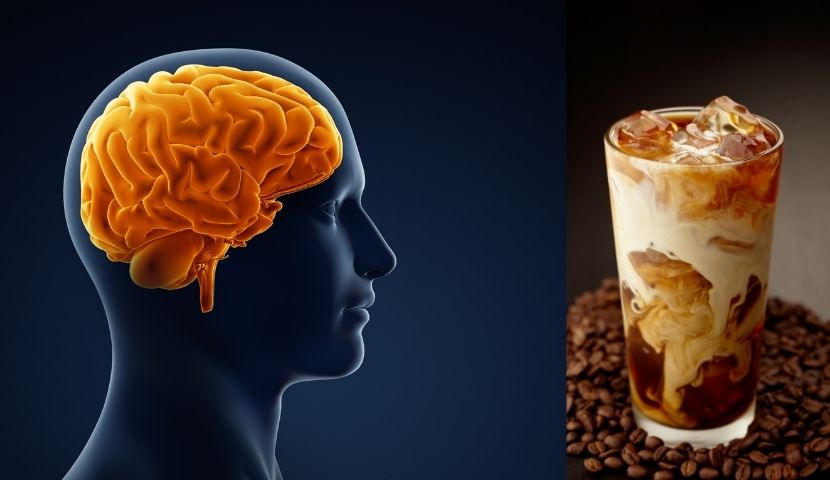Coffee, for many, is more than just a drink—it’s a lifestyle. The rich aroma, the energizing kick, and the comforting warmth make it an integral part of daily life. However, there’s a growing debate about how coffee affects mental health, particularly regarding anxiety. Does coffee reduce anxiety, or does it amplify it?

This article dives deep into the science behind caffeine’s effects on anxiety and mental well-being, offering a balanced view for coffee lovers.
Understanding the Connection Between Coffee and Anxiety
The Role of Caffeine in the Brain
Caffeine, the primary active ingredient in coffee, is a stimulant that directly affects the central nervous system. It works by blocking adenosine, a neurotransmitter that induces sleepiness, leading to an increase in the production of other neurotransmitters such as dopamine and norepinephrine. These chemicals are often referred to as “feel-good” hormones because they elevate mood and increase alertness.
However, caffeine’s stimulating effects are a double-edged sword. While it helps boost energy and concentration, it can also trigger a cascade of stress responses in the body. One of the most significant effects is the release of cortisol, often referred to as the “stress hormone.” In individuals who are sensitive to caffeine, this can increase feelings of nervousness and unease, which might lead to heightened anxiety.
Caffeine and Anxiety: A Delicate Balance
The relationship between caffeine and anxiety is not straightforward. Research suggests that moderate caffeine intake—roughly 200 to 400 milligrams per day (about two to four cups of coffee)—does not typically exacerbate anxiety for most people. In fact, some studies suggest that moderate caffeine consumption can help reduce the risk of depression and anxiety disorders.
However, excessive caffeine intake—especially in sensitive individuals—can trigger anxiety symptoms. For example, a study in PubMed Central found that high doses of caffeine can significantly increase the risk of anxiety, panic attacks, and general nervousness, especially in individuals who are already prone to anxiety or have underlying mental health conditions. On the flip side, moderate coffee consumption has been associated with a lower risk of developing depression. This highlights that moderation is key.
The Impact of Coffee on Mental Health

Positive Effects of Coffee on Mood
For many coffee drinkers, the benefits go beyond the physical boost. Caffeine has been shown to have mood-enhancing properties, which may help reduce feelings of depression and fatigue. Here are some reasons why coffee might improve your mood:
- Dopamine Boost: Coffee stimulates the release of dopamine, a neurotransmitter that is crucial for feelings of pleasure and motivation. This contributes to the sensation of “well-being” many people associate with their morning cup.
- Enhanced Cognitive Function: Moderate caffeine intake has been shown to improve focus, concentration, and mental clarity, which can reduce feelings of stress caused by mental fatigue.
- Reduced Risk of Depression: Some studies have suggested that caffeine may play a role in reducing the risk of developing depression. Caffeine can help prevent serotonin depletion, a neurotransmitter associated with mood regulation.
Potential Negative Effects on Anxiety
Despite its positive effects, caffeine can also have negative repercussions for some individuals, especially when consumed in excess. Too much caffeine can produce side effects that mimic anxiety:
- Increased Heart Rate: One of the most common symptoms of caffeine-induced anxiety is an elevated heart rate. This is because caffeine stimulates the release of adrenaline, which activates the “fight-or-flight” response.
- Restlessness and Jitters: Caffeine can also cause physical symptoms such as restlessness, nervousness, and jitteriness, all of which are commonly associated with anxiety.
- Sleep Disruption: Coffee consumed too late in the day can interfere with sleep, leading to fatigue and increased anxiety the following day. Poor sleep is strongly linked to mental health problems like anxiety and depression.
- Panic Attacks: High doses of caffeine, particularly those equivalent to five or more cups of coffee, have been linked to panic attacks in some individuals with panic disorder.
How Much Coffee Is Too Much?
Recommended Caffeine Intake
Health experts generally recommend that adults limit caffeine intake to no more than 400 milligrams per day, which is roughly equivalent to four cups of coffee. This amount is considered safe for most individuals and unlikely to lead to negative mental health effects.
However, individual tolerance to caffeine can vary. While some people can drink several cups a day without issues, others may start to experience anxiety symptoms with even a modest amount of coffee.
Signs You Might Be Consuming Too Much
It’s essential to listen to your body and be aware of the signs that you’re overdoing it with caffeine. Some common indicators of excessive caffeine consumption include:
- Increased heart rate or palpitations
- Restlessness or nervousness
- Insomnia or difficulty falling asleep
- Tremors or shaking
- Digestive issues, like stomach discomfort or acid reflux
- Increased feelings of anxiety or panic
If you notice any of these symptoms, it might be a good idea to reduce your caffeine intake and see if it improves your anxiety levels.
Strategies to Enjoy Coffee Without Increasing Anxiety

1. Monitor Your Intake
The first step in managing your caffeine consumption is keeping track of how much you’re drinking. Remember, coffee isn’t the only source of caffeine—tea, energy drinks, and even chocolate contain varying amounts of caffeine. Being mindful of your total caffeine intake can help you stay within safe limits and reduce the risk of anxiety.
2. Choose Low-Caffeine Options
If you’re sensitive to caffeine but still enjoy the taste of coffee, consider switching to low-caffeine options. Decaffeinated coffee or low-caf blends provide the comforting experience of coffee without the high caffeine content. Alternatively, try mixing your regular coffee with decaf to reduce caffeine intake while maintaining the flavor.
3. Avoid Coffee on an Empty Stomach
Drinking coffee on an empty stomach can amplify its stimulating effects, making you more prone to nervousness and irritability. Try pairing your coffee with a balanced meal or snack to mitigate the negative effects of caffeine.
4. Pay Attention to Timing
To avoid the sleep-disrupting effects of caffeine, try limiting your coffee intake to the morning hours. Caffeine can stay in your system for several hours, so drinking coffee late in the day can interfere with your ability to fall asleep, which may increase anxiety the following day.
5. Consider Your Personal Sensitivity
Some people are naturally more sensitive to caffeine and may experience heightened anxiety symptoms even with small amounts. If you’re prone to anxiety, you might want to consider switching to non-caffeinated beverages or reducing your coffee intake.
Caffeine and Anxiety: Expert Opinions
“Moderate caffeine consumption has been linked to improved cognitive function and mood regulation. However, for those who are predisposed to anxiety, caffeine can exacerbate symptoms. I always advise my patients to monitor their caffeine intake and adjust it based on their personal response.”
“Caffeine affects everyone differently. While some individuals find it helps with focus and mental clarity, others experience heightened anxiety or even panic attacks. It’s essential to understand your body’s unique reaction to caffeine and adjust your intake accordingly.”
Conclusion: Coffee and Anxiety—Finding the Right Balance
The impact of coffee on anxiety is complex and individualized. While moderate caffeine intake can boost mood, increase alertness, and reduce the risk of depression, excessive consumption can trigger anxiety symptoms, especially in sensitive individuals. By understanding your personal tolerance to caffeine and adjusting your intake accordingly, you can enjoy your coffee without sacrificing your mental well-being.
If you’re experiencing anxiety symptoms that you believe may be related to caffeine, it’s a good idea to consult a healthcare professional. They can help guide you toward a balanced approach that works best for you.
- Checkout the Best Coffee Making Machines in the USA Today
Remember, when it comes to coffee and anxiety, moderation is key. Enjoy your cup of joe, but do so mindfully!
Additional Resources on Coffee and Mental Health:
- How Coffee Affects Mood and Anxiety – ScienceDirect
- Caffeine and Depression – Verywell Mind



0 Comments